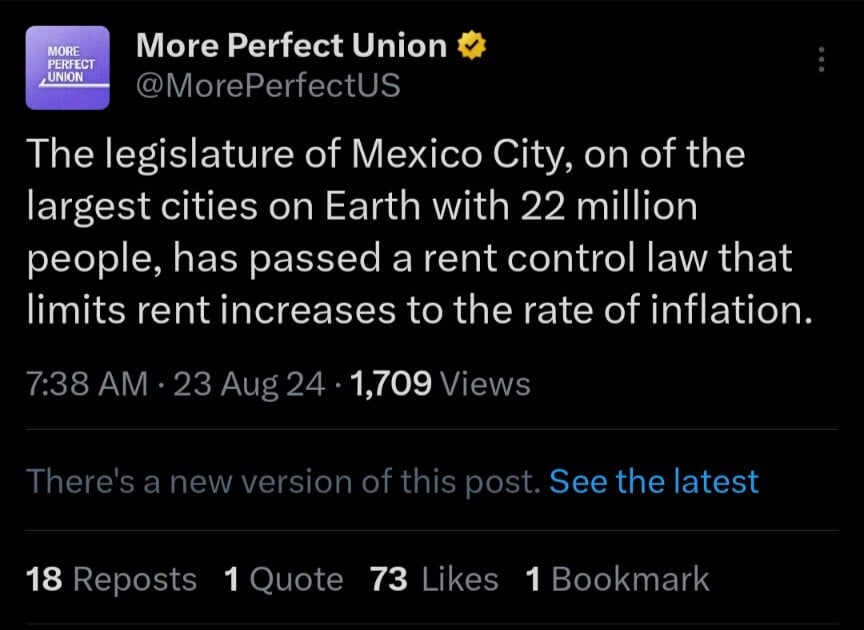this post was submitted on 23 Aug 2024
304 points (98.4% liked)
Housing Bubble 2: Return of the Ugly
305 readers
19 users here now
A community for discussing and documenting the second great housing bubble.
founded 6 months ago
MODERATORS
you are viewing a single comment's thread
view the rest of the comments
view the rest of the comments

Hasn't it been found that rent control has a negative impact on improving housing supply, which would, in turn, make rent more affordable?
Rent control disincentivizes new housing construction because developers wouldn't see a return on their investment, or have a risk of such if it were implemented in their area. With housing shortages nearly everywhere, thus high demand, thus high prices, would it not be in everyone's best interest to instead incentivise construction to increase supply to meet that demand?
Edit for sources:
The Effects of Rent Control Expansion on Tenants, Landlords, and Inequality: Evidence from San Francisco
Why Rent Control Doesn't Work (Freakonomics)
If private capital won't develop homes, the government should fund the housing project of residents that want to live there.
Which government? The municipality, province/state, or federal? There's already a significant lack of housing for the people who need it most, with the aforementioned three entities often fighting over who should pay for it. Along with that, there's strong evidence that providing stable housing to homeless is quite effective in reducing public service costs elsewhere.
While I would love to see everyone have a stable home available to them, the lack of progress for even those needing it most, despite clear evidence of the return on investment of public funds, I am not hopeful that any government will be funding significant development projects that can have an impact on lack of housing supply anytime soon.
Which ever government has financing. It wouldn't be free. The gov would collect interest and make money just like any private developer. Considering this is basically how Freddie Mac already operates with Single Family Homes it's not a stretch to extend this gov financing to big multifamily projects owned by tenants.
Ah, I see what you mean. Not a bad idea if it can be done with a good design team and good construction oversight. I would fear government housing projects being built as cheaply as possible though, when well designed and constructed buildings bring far greater return.
This is just a cap on the rate increase, not a complete rent price cap. However, you are correct in that rent controls tend to dencentivise new construction, but there are other factors besides rent control that go into that. In other words: it's complicated
Lol getting down voted for stating what the experts say and also backing it up with sources.
Thanks for trying.
I was curious why as well but then saw the community name and I came from browsing all.
It's definitely not black and white though. And perhaps some well-planned and well-written rent control legislation can avoid the negatives that are commonly found.
So, this ain't a HARD LINE finding, but it's a popular opinion in economist circles.
Here's a great video on the topic by unlearning economics:
https://www.youtube.com/watch?v=4epQSbu2gYQ&t=1259
Interesting. Yes, it's definitely not black and white. I didn't find the income inequality argument quite as confusing though. While it is good for existing tenants to be able to stay, I feel that increased inequality could lead to richer tenants putting pressure on poorer tenants, or their landlords, to leave, as they don't "fit" in the neighbourhood, which is a negative effect in my opinion.
Of course, that then brings in all the intricacies of how to properly manage gentrification...
"rent control" and "managed gentrification" are kind of two sides for same coin
The basic tenet is that downward pressure on any existing investment tends to put upward pressure on new investments from similar firms, sometimes pricing investors out.
In this case it's rent control putting caps on return outside market fluctuations. It causes builder firms to take on the financial burden of getting return on investment by pricing newer units higher. This prices out people and sometimes locks them into the rent control system as they can't afford the now higher priced newer housing.
This causes fewer units to be built as now you have to target a smaller but more financially viable market segment so "affordable housing" takes a slump.
The asterisk here is that people living in their current housing don't end up on the street, but it severely hampers city growth, as new tenents can't find affordable housing.
By Itself I don't think rent control is a net positive thing for a community, but rent control to keep tenents in their existing homes combined with heavy investment into real estate development from the government is a great one-two punch to eliminate homelessness.
Problem is #2 costs money while #1 doesn't so... Most of the time you only see politicians trying to focus down on the rent control.
Even problem #2 can have a net positive return when the societal costs of homelessness are factored in.
The effect it has on housing supply is hard to figure out since there are so many other confounding factors.
It does have a more direct positive effect against displacement and evictions.
So it's a tradeoff between housing stability on one hand and possibly lower rents for new residents and people moving.
So if your average renter is a family who is going to stay in one place for 20 years while they raise there kids then rent control is good. If your average renter is a 20 something moving around the city every couple years then it may negatively impact them.
Right, that's similar to what the study I linked found. From the abstract:
And the conclusion:
spoiler